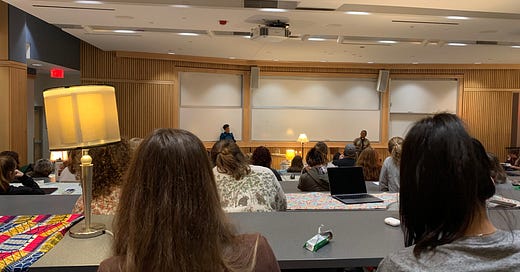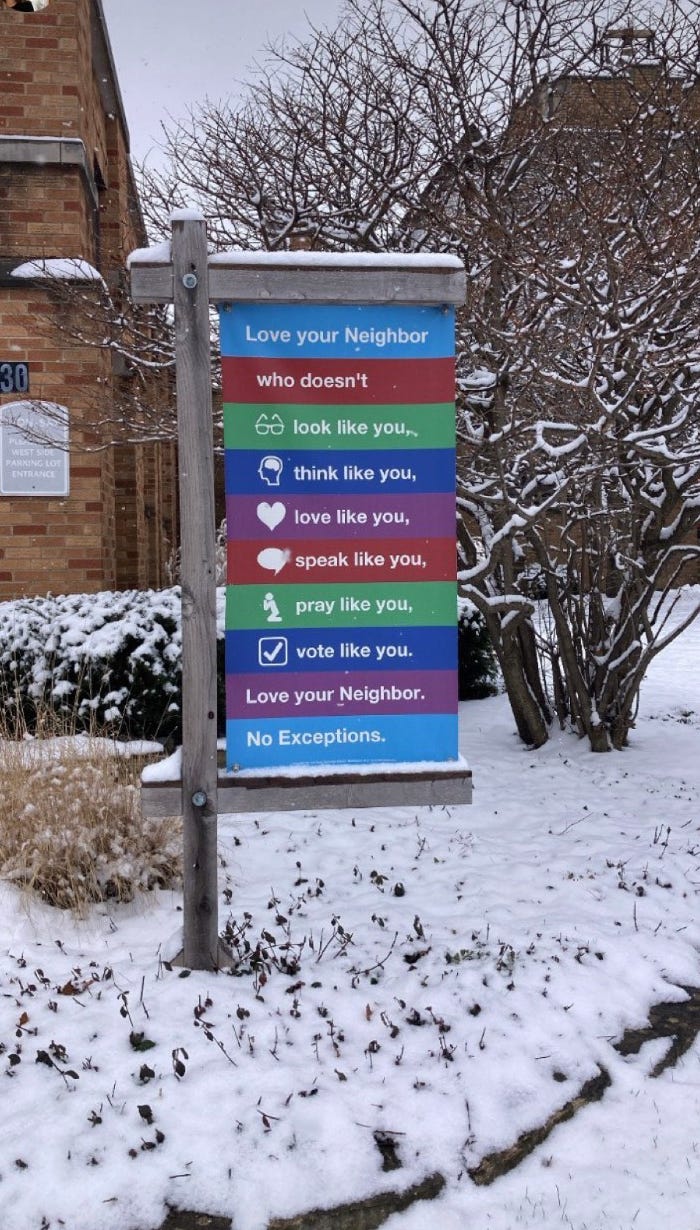Hello, friends!
It’s a snowy day here in Wheaton and I have spent most of the day lounging in my dorm watching movies instead of working. After discovering A Rainy Day in New York, it has officially become my new favorite film so I think the trade-off was worth it.
Transitioning back to life at Wheaton has been a mix of stressful and exciting. I’ve enjoyed all my classes, started writing again for our newspaper, and will soon transition into a position of leadership at my Phonathon job. Although I’ve been busy, it’s been a fruitful time.
Snowy Sundays always make up for a busy week though, and the coziness of being a homebody in winter is one thing I love so much about the season.
I’ve spent a lot of time on this newsletter talking about the idea of home, but haven’t written too much on what creates home for me. Over the past few months, I’ve thought about the topic of hospitality and what it means to me.
When has someone welcomed me into a hospitable space? How have I shown hospitality? What is its significance?
Each of these questions began arising from a class I took last semester: HNGR 114 – Poverty, Justice, and Transformation. HNGR (human needs and global resources) is a program at Wheaton that offers a unique study aboard experience, which I’m currently in the works of applying for. This class is one of their requirements.
One of my main takeaways from the class (and the HNGR program in general) was the practice of hospitality.
It began during a symposium we had when two South African guests (Rev. René August and Karen Dudley) came to the college to speak on the conenctions between hospitality, Christianity, and the violence they’ve witnessed in South Africa.
During Dudley’s lecture, she shared with the audience how she, as a chef, prepares her house for incoming guests. How she sets the table.
This talk made me think of all the ways I’ve been welcomed around a table and how powerful that experience can be for someone.
Towards the end of the semester, the class focused a lot on El Salvador, structural violence, and the practice of lament. Suffice to say, there was a lot to lament throughout the course.
After discussing and looking into examples of structural violence, it became difficult to even see any kind of hope in these types of situations. What can people do when their own country turns against them? What does it mean when violence takes on the structural level of society?
During this particular unit we read The Weight of All Things by Sandra Benitez, a historical fiction about the civil war in El Salvador all told from the perspective of a young boy. This is when I returned to the spiritual discipline of hospitality.
I wrote my final paper on hospitality as one means to dismantle structural violence.
“At the end of the chapter the narrator states, ‘In one hand, the feel of his mother’s letter, a form of assurance restored. In the other hand, like an undeserved reward, a second tangerine. Throughout his life, it was unsolicited kindness that the scent of tangerines recalled’ (Benítez 81). For a child who felt hungry and struggling with the denial of mother’s death, the way Alvarado gave so freely and welcomed him displayed a special kind of generosity amid war times. Hospitality welcomed Nicolás into the home and unsolicited generosity shaped his visit. In two simple acts of kindness, I believe he impacted Nicolás’ life in the long term.
—
Lament serves a greater part of the Christian life than I was ever taught in church and is a great tool for learning to come alongside others during tragedy. Far too often, I have witnessed Christians pushing for joy and happiness where there needs to be moments of pause and lament. From learning more about El Salvador and the spiritual practice of lament, I hope to cultivate a hospitable space for others by sitting with them in their suffering and listening to their cries.”
From this one scene towards the beginning of Benitez’s novel, I started to think about the ways in which hospitality has vast power to inform someone’s character and change lives, even helping to change a society.
This has prompted me in the past few months to look back at moments where someone showed me hospitality.
I think back to my Arabic lessons in Cairo where my brother and I’s teacher would always go downstairs during our breaks to make us a cup of tea.
My mind then goes to my two childhood best friends’ families both welcoming me in their homes unconditionally. All the sleepovers, photoshoots, movies, experimenting with cooking, and spa days at those apartments. Not once do I recall feeling like those families wanted me to leave. I have always felt welcome in those homes.
Then I think of the general warmth of Arab hospitality. Each table I have sat at that always piled more on my empty plate urging me to keept eating the food that took all day to prepare.
I look back at last spring when my assigned group for anthropology went to a Hare Krishna service at a local temple. People there made sure we had a place to sit and at the end as they brought out dinner, they made sure to feed us first.
There was also a particular thanksgiving spent in Egypt where numerous people filled our house that always reminds me of my mom’s hospitable spirit. The way she will spend hours preparing for guests to welcome or even as a guest herself, spend time cleaning the place she stayed in. My dad and I have a running joke with her that she never seems to get everything organized or make our favorite desserts until she knows a guests is coming. But such is hospitality and such is my mom’s kindness. It’s making the stranger, acquaintance, and friend feel welcome.
Within these moments of “unsolicited kindness,” I have found glimpes of Christ’s love and of the invitation to love your neighbor well.
What also strikes me about these moments is that the hospitality I felt did was not dependent on the space itself, but rather the hearts of those who welcomed me in. Hospitality is more than a clean house with a set table ready for hungry guests. It is also the person opening the door, having conversation, and caring enough to care for you.
To have a hospitable space, you must also have a heart of hospitality. One that is willing to listen and care for others, welcoming in the family, the friend, and the foreigner.
Most ardently,
Alayna Brianne








I loved this piece Alayna!
If you haven’t yet you should definitely read Start With Hello (And Other Simple Ways to Live as Neighbors) by Shannan Martin. It’s all about creating deeper connection through simple resets for instance open door > perfect decor; familiar > fussy; tender > tough. Your post reminds me so much of this book and the hope of being human together. ❤️